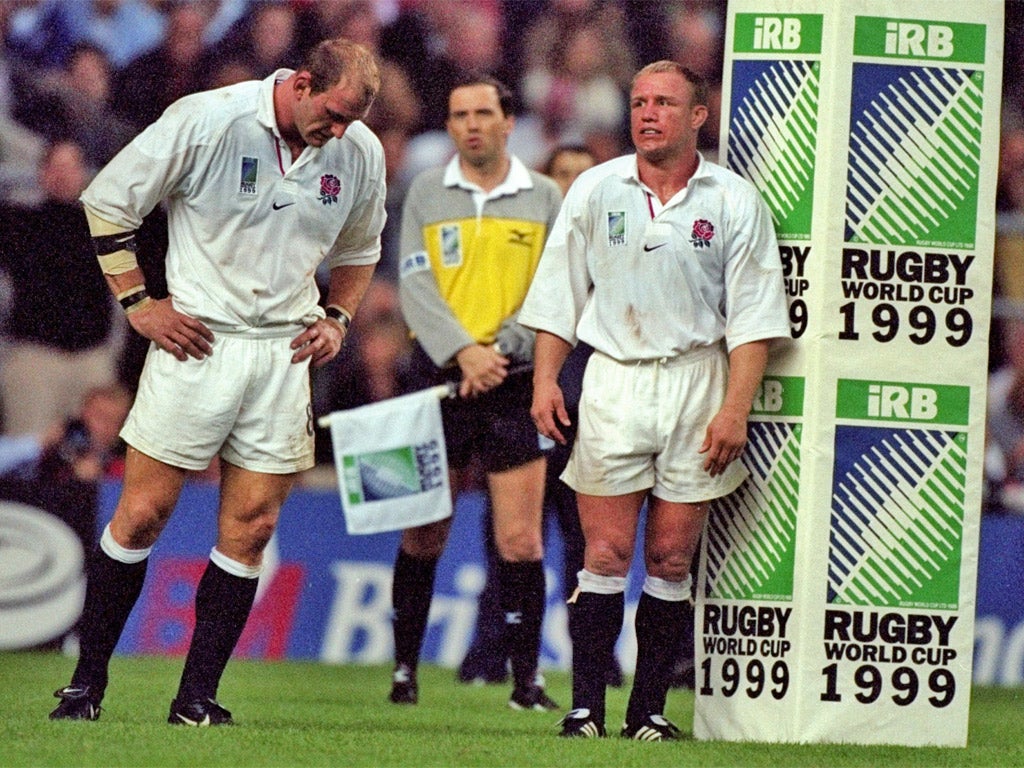English World Cup could be disrupted by breakaway row
Prolonged dispute over clubs' Heineken Cup exit may undermine money-spinning event

The next World Cup – the first to be held on red-rose soil in the professional era and by some distance the most significant event in English rugby history – is precisely two years distant, and according to the chief executives at the heart of it, the important "building blocks" are already in place. Unfortunately for them, foundations have also been laid for a boardroom row that could turn the next 24 months into a diplomatic morass.
Today, the chairmen and owners of the 12 English Premiership clubs were gathering in London for initial discussions over the shape of a new Anglo-French tournament that has the potential to bust the European game wide open. Having decided some time ago that the sport's most popular club competition, the Heineken Cup, was a dead duck and that its organising body was no longer worthy of recognition, they were not exactly falling over themselves in the rush to accept an invitation to a summit meeting in Dublin aimed at reaching a new accord with the other nations involved in elite cross-border rugby: Ireland, Scotland, Wales and Italy.
Ian Ritchie, the Rugby Football Union CEO, and his counterpart at the England 2015 delivery body, Debbie Jevans, joined forces today to talk up the positive aspects of their World Cup planning to date, but both were aware of the landslide that will engulf them if the two sides in the European dispute remain at loggerheads. The build-up to the 1999 global tournament, nominally hosted by Wales but played across the continent, unfolded against the backdrop of a similar ruckus, and the going on that occasion was very hard indeed.
Ritchie acknowledged the urgency of the situation, which is more than could be said for the beleaguered Heineken Cup hierarchy, who for reasons best known to themselves considered the back-end of October – a full five weeks away – to be the optimum moment for a resumption of negotiations. The CEO also indicated that the RFU was standing four-square behind the Premiership clubs in their demands for a better deal out of European competition, both competitively and commercially.
"We are in favour of a meritocratic tournament in Europe, a tournament equitable in terms of competitive structure and financial distribution," he said, echoing the words of the Premiership fraternity stretching all the way back to the Dark Ages of the 1990s. He did not, however, show the slightest sign of supporting the proposed Anglo-French breakaway, insisting instead that a revamped multi-nation event was the way ahead.
"I certainly get it," he said, David Cameron-style, "that this must be dealt with as a matter of urgency, and it seems to me that the definition of a European competition is that most of Europe participates in it. As we're trying to grow this game of rugby, it seems sensible to open it up to teams from countries who aspire to play at the top level. We want to support our clubs and we want to facilitate a solution. Are the discussions fraught? Are they occasionally difficult and challenging? All of the above. But I think we are all very clear as to the objective and I remain optimistic."
None of which shone much light on how far the RFU might go in backing its senior clubs when push comes to shove. Indeed, Ritchie spent most of his time stressing the need for the prevailing issues to be thrashed out in private rather than in public, hence his refusal to confirm or deny claims from the European Rugby Cup chairman, Jean-Pierre Lux, that the union had promised to block any move towards an Anglo-French competition. "We're having extensive discussions with the clubs and others, but I'm not going to give away my negotiating position," the CEO remarked.
The truth of the matter is that Ritchie finds himself between a rock and a hard place, and that he will not easily extricate himself. The Premiership clubs, blessed with unprecedented wealth from their game-changing broadcasting deal with BT Sport, are in a far stronger position than they were in 1998-99, when they defied the RFU and virtually the whole of international opinion by dropping out of the Heineken Cup for a season. By the same yardstick, governing bodies across Europe are much weaker: if they found themselves in court answering restraint of trade allegations, they would find it very difficult to win.
What alarms them most is the prospect of a prolonged dispute undermining preparations for a World Cup that is expected to generate sufficient money to support the international game for years to come. According to Jevans, who played a leading role in organising last year's London Olympics, the tournament will be worth £300m in hospitality, travel packages and ticket sales alone.
"One of the frustrations with the Olympics was dealing with 26 sports and being unable to do a 'deep dive' into all of them," she said. "We have no excuses when it comes to this World Cup, which is a single-sport event, and I am absolutely confident that, in two years' time, we'll look back and say, 'Yep, we got that right'."
The ticketing strategy, which will give individual rugby club members a degree of priority access, is close to being finalised, and details are expected by the end of November, along with confirmation of 20-plus training bases around the country. Will the Heineken Cup crisis be over by then? Probably not.
Subscribe to Independent Premium to bookmark this article
Want to bookmark your favourite articles and stories to read or reference later? Start your Independent Premium subscription today.

Join our commenting forum
Join thought-provoking conversations, follow other Independent readers and see their replies